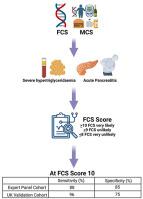当前位置:
X-MOL 学术
›
Atherosclerosis
›
论文详情
Our official English website, www.x-mol.net, welcomes your feedback! (Note: you will need to create a separate account there.)
Validation of the familial chylomicronaemia syndrome (FCS) score in an ethnically diverse cohort from UK FCS registry: Implications for diagnosis and differentiation from multifactorial chylomicronaemia syndrome (MCS)
Atherosclerosis ( IF 5.3 ) Pub Date : 2024-02-10 , DOI: 10.1016/j.atherosclerosis.2024.117476 Bilal Bashir , See Kwok , Anthony S. Wierzbicki , Alan Jones , Charlotte Dawson , Paul Downie , Fiona Jenkinson , Hannah Delaeny , Michael Mansfield , Dev Datta , Yee Teoh , Paul Hamilton , Natalie Forrester , Dawn O'Sullivan , Maryam Ferdousi , Paul N. Durrington , Alaa AbdelRazik , Antonio Gallo , Philippe Moulin , Handrean Soran
Atherosclerosis ( IF 5.3 ) Pub Date : 2024-02-10 , DOI: 10.1016/j.atherosclerosis.2024.117476 Bilal Bashir , See Kwok , Anthony S. Wierzbicki , Alan Jones , Charlotte Dawson , Paul Downie , Fiona Jenkinson , Hannah Delaeny , Michael Mansfield , Dev Datta , Yee Teoh , Paul Hamilton , Natalie Forrester , Dawn O'Sullivan , Maryam Ferdousi , Paul N. Durrington , Alaa AbdelRazik , Antonio Gallo , Philippe Moulin , Handrean Soran

|
Prognosis and management differ between familial chylomicronaemia syndrome (FCS), a rare autosomal recessive disorder, and multifactorial chylomicronaemia syndrome (MCS) or severe mixed hyperlipidaemia. A clinical scoring tool to differentiate these conditions has been devised but not been validated in other populations. The objective of this study was to validate this score in the UK population and identify any additional factors that might improve it. A retrospective validation study was conducted using data from 151 patients comprising 75 FCS and 76 MCS patients. All participants had undergone genetic testing for genes implicated in FCS. Validation was performed by standard methods. Additional variables were identified from clinical data by logistic regression analysis. At the recommended FCS score threshold ≥10 points, the sensitivity and specificity of the score in the UK population were 96% and 75%, respectively. The receiver operating characteristic (ROC) curve analysis yielded an area under the curve (AUC) of 0.88 (95% CI 0.83–0.94, < 0.001). This study identified non-European (predominantly South Asian) ethnicity, parental consanguinity, body mass index (BMI) < 25 kg/m, and recurrent pancreatitis as additional positive predictors, while BMI >30 kg/m was found to be a negative predictor for FCS. However, inclusion of additional FCS predictors had no significant impact on performance of standard FCS score. Our study validates the FCS score in the UK population to distinguish FCS from MCS. While additional FCS predictors were identified, they did not improve further the score diagnostic performance.
中文翻译:

在英国 FCS 登记处的不同种族队列中验证家族性乳糜微粒血症综合征 (FCS) 评分:对诊断和鉴别多因素乳糜微粒血症综合征 (MCS) 的意义
家族性乳糜微粒血症综合征 (FCS)(一种罕见的常染色体隐性遗传疾病)与多因素乳糜微粒血症综合征 (MCS) 或严重混合性高脂血症的预后和治疗有所不同。已经设计出一种区分这些病症的临床评分工具,但尚未在其他人群中得到验证。这项研究的目的是在英国人群中验证这一分数,并确定可能提高该分数的任何其他因素。使用 151 名患者(包括 75 名 FCS 患者和 76 名 MCS 患者)的数据进行了回顾性验证研究。所有参与者都接受了与 FCS 相关的基因检测。通过标准方法进行验证。通过逻辑回归分析从临床数据中确定了其他变量。在推荐的 FCS 评分阈值≥10 分时,英国人群中评分的敏感性和特异性分别为 96% 和 75%。受试者工作特征 (ROC) 曲线分析得出曲线下面积 (AUC) 为 0.88 (95% CI 0.83–0.94, < 0.001)。这项研究将非欧洲(主要是南亚)种族、父母血缘关系、体重指数 (BMI) < 25 kg/m 和复发性胰腺炎确定为额外的阳性预测因子,而 BMI > 30 kg/m 被发现是阴性预测因子对于FCS。然而,纳入额外的 FCS 预测因子对标准 FCS 评分的性能没有显着影响。我们的研究验证了英国人群的 FCS 评分,以区分 FCS 和 MCS。虽然确定了其他 FCS 预测因子,但它们并未进一步提高评分诊断性能。
更新日期:2024-02-10
中文翻译:

在英国 FCS 登记处的不同种族队列中验证家族性乳糜微粒血症综合征 (FCS) 评分:对诊断和鉴别多因素乳糜微粒血症综合征 (MCS) 的意义
家族性乳糜微粒血症综合征 (FCS)(一种罕见的常染色体隐性遗传疾病)与多因素乳糜微粒血症综合征 (MCS) 或严重混合性高脂血症的预后和治疗有所不同。已经设计出一种区分这些病症的临床评分工具,但尚未在其他人群中得到验证。这项研究的目的是在英国人群中验证这一分数,并确定可能提高该分数的任何其他因素。使用 151 名患者(包括 75 名 FCS 患者和 76 名 MCS 患者)的数据进行了回顾性验证研究。所有参与者都接受了与 FCS 相关的基因检测。通过标准方法进行验证。通过逻辑回归分析从临床数据中确定了其他变量。在推荐的 FCS 评分阈值≥10 分时,英国人群中评分的敏感性和特异性分别为 96% 和 75%。受试者工作特征 (ROC) 曲线分析得出曲线下面积 (AUC) 为 0.88 (95% CI 0.83–0.94, < 0.001)。这项研究将非欧洲(主要是南亚)种族、父母血缘关系、体重指数 (BMI) < 25 kg/m 和复发性胰腺炎确定为额外的阳性预测因子,而 BMI > 30 kg/m 被发现是阴性预测因子对于FCS。然而,纳入额外的 FCS 预测因子对标准 FCS 评分的性能没有显着影响。我们的研究验证了英国人群的 FCS 评分,以区分 FCS 和 MCS。虽然确定了其他 FCS 预测因子,但它们并未进一步提高评分诊断性能。



























 京公网安备 11010802027423号
京公网安备 11010802027423号